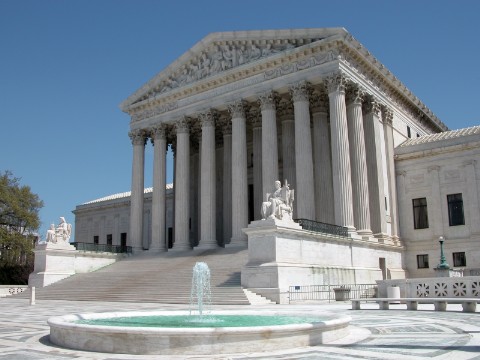
In Wood v. Moss, the Court will decide whether Secret Service agents engaged in unconstitutional viewpoint discrimination when they moved anti-Bush protesters about one block further from the President than pro-Bush demonstrators. The Court also will decide whether the lower court evaluated the viewpoint discrimination claim at too high a level of generality when determining whether the agents should have been granted qualified immunity. The State and Local Legal Center (SLLC) filed an amicus brief in this case, which ICMA joined.
Pro- and anti-President Bush demonstrators had equal access to the President as his motorcade arrived in Jacksonville, Oregon. But when the President made an unexpected stop for dinner at the Jacksonville Inn’s outdoor patio, Secret Service agents (assisted by state and local police officers) moved the anti-Bush protesters, who were closer to the restaurant than the pro-Bush demonstrators, about one block further from the President than the pro-Bush demonstrators. The anti-Bush protesters sued two Secret Service agents claiming their First Amendment right to be free from viewpoint discrimination had been violated. The Ninth Circuit denied the agents qualified immunity. Government officials can be sued for money damages in their individual capacity if they violate a person’s constitutional rights. Qualified immunity protects government officials from such lawsuits where the law they violated isn’t “clearly established.”
The Supreme Court will decide whether the lower court evaluated the qualified immunity question in this case too generally. The Ninth Circuit focused on its conclusion that the agents engaged in viewpoint discrimination instead of whether it was clearly established that the anti-Bush protesters could not be moved further away from the President than the pro-Bush demonstrators. The Court also will decide whether the anti-Bush protesters have adequately claimed viewpoint discrimination when there was an obvious security-based rationale for moving them: they were closer to the President.
The SLLC’s amicus brief encourages the Court to tour downtown Jacksonville using Google Maps Street View. What the Justices will discover is that there is a parking lot adjacent to the Jacksonville Inn’s outdoor patio which the anti-Bush protesters would have had direct access to had they not been moved a block away. Pro-Bush demonstrators had no direct access to the Inn where they were gathered because the side of the Inn they were facing was totally blocked by another building. The SLLC’s brief also argues that when the safety of the President is a stake, police may consider the content of speech. Finally, the brief argues that the lower court evaluated the qualified immunity question in this case without consideration of the facts.
The National Conference of State Legislatures, the National League of Cities, the National Association of Counties, the United States Conference of Mayors, the International Municipal Lawyers Association, and the National Sheriffs’ Association joined ICMA in signing onto the SLLC's brief.
Oral argument will be March 26, and the Court will issue an opinion by the end of June.
New, Reduced Membership Dues
A new, reduced dues rate is available for CAOs/ACAOs, along with additional discounts for those in smaller communities, has been implemented. Learn more and be sure to join or renew today!
